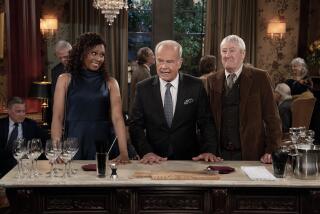Laughing to the end
- Share via
GEORGE MacDONALD FRASER would have you believe that he died, on Jan. 2 of this year, an angry man. Or at least a disaffected, curmudgeonly, irascible one. George MacDonald Fraser, you will remember, wrote the Flashman series, in which the nasty little bully of “Tom Brown’s School Days” (by Thomas Hughes) has grown up to be a cowardly womanizer who just happens to save the day at every miserable misadventure 19th century British forces engage in as they attempt to preserve the empire.
Fraser was a successful novelist, and he survived himself by three days in order to damn the present era in an article in the Daily Mail: “But much has deteriorated. The United Kingdom has begun to look more like a Third World country, shabby, littered, ugly, run down, without purpose or direction, misruled by a typical Third World government, corrupt, incompetent and undemocratic.” In the Weekly Standard, Christopher Hitchens quoted Fraser as saying of Tony Blair, “It makes my blood boil to think of the British soldiers who’ve died for that little liar.” Blair haters across the spectrum can sympathize. But a sad thing, for me, is the way that Fraser’s death was greeted by organs of the right wing, such as the Wall Street Journal, as another opportunity to bash liberals.
Anyone who has read the Flashman series will tell you that Flashy never saw an authoritarian or imperialist he couldn’t make fun of -- and cuckold too. In fact, the first person I knew who read and loved Flashy was a Marxist.
The Flashman books are purportedly drawn from a cache of papers detailing the exploits of Harry Flashman, who, after being expelled from Rugby School, manages to get himself into the army just in time to be sent off to India. Flashy’s virtues as a soldier are that he can ride a horse and wield a saber. His eye for a likely escape route is unexcelled. That he is a liar and a coward goes without saying, except by him. Flashy also has a wonderful sense of humor, which is his greatest charm. He particularly appreciates jokes of which he himself is the butt.
Once in India, Flashy is assigned to duty in the First Afghan War, and if the Soviets and Dick Cheney had bothered to read “Flashman” before they sent their troops in, we wouldn’t be in the mess we’re in today. Fraser’s historical research was meticulous and clearly presented, both in the text (because Flashy is a blowhard, always offering derisory opinions of the nonsensical aims of his superiors) and in the footnotes, which are written in their own skeptical style. The pointless difficulties of the First Afghan War are vividly demonstrated in “Flashman,” and in the course of the action many British soldiers do die for a lie.
Over his long career, Flashy gets to America (he’s not in favor of slavery), to China, to Africa, to Russia. I have followed him happily on most of his adventures (though the passages about cricket in “Flashman’s Lady” sank me). My second favorite, after “Flashman,” is “Flashman at the Charge,” about, among other things, the Crimean War. Fraser seems to have agreed with Charles Dickens that the level of incompetence the British manifested in the Crimea was unprecedented in its day. (To think we have surpassed it!) But, astonishingly, Fraser’s analysis is both clearer and funnier than Dickens’.
One of the great things about Flashy is that even though he favors unprintable epithets for blacks and Chinese and derogatory terms to describe nearly every type he meets (including women, Calvinists and Scots), he’s full of honest admiration for the decent and the brave, such as Abraham Lincoln, whom he encounters when Lincoln is a freshman congressman, in “Flash for Freedom!” Flashy is no right-winger; he’s an anarchist and a populist, albeit a self-serving, lustful one. And that’s another thing -- he has honest admiration for female sexuality and power too.
If Fraser hadn’t died, I would have loved to interview him at the coming L.A. Times Festival of Books. His career in Hollywood was as long as his career as the creator of the Flashman series (he also wrote several other books), and I thought it was a shame that he never appeared there. Perhaps he really was the dragon of his Daily Mail piece and would have burned me to a crisp right on the stage, but having read his latest novel -- “The Reavers,” published last year in the U.K. and due out here April 24 -- I think not. In fact, I think having a good laugh trumped all for George MacDonald Fraser.
Fraser was born just below the Scottish border (in Carlisle), and “The Reavers” is set in the Borders country (rather in the way “Cat Ballou” is set in the Old West), during the 1590s. The plot is long on action and short on sense, but Fraser’s use of the English language is masterful and playful at the same time. My favorite character, a Scottish highwayman whose sex appeal is his deadliest weapon, speaks in carefully spelled-out dialect and is unfailingly funny. “The Reavers” is a novel-like confection that makes full use of the wealth of idioms, slang and braggadocio (not omitting those current in Hollywood) that English has to offer. So, maybe Fraser’s Daily Mail diatribe against political correctness was only his second-to-last word: Maybe he died with a laugh on his lips, as I’m sure Harry Flashman did.
More to Read
Sign up for The Wild
We’ll help you find the best places to hike, bike and run, as well as the perfect silent spots for meditation and yoga.
You may occasionally receive promotional content from the Los Angeles Times.






